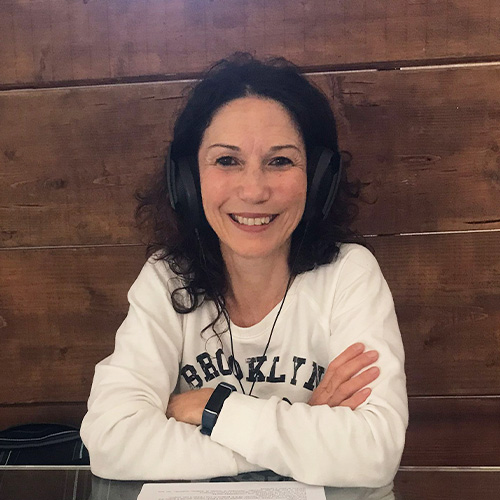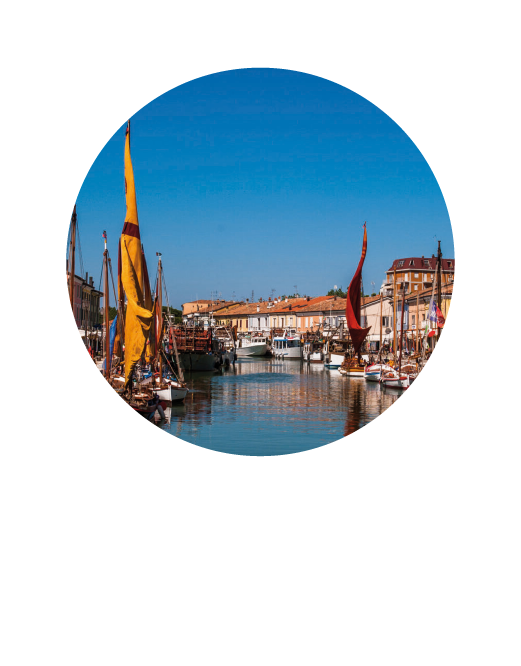

The bench in the garden of the Arches, Giardino degli Archi
The bench in the garden of the Arches, Giardino degli Archi
Riproduci traccia audio
Play audio track
Audio-Track abspielen
The bench in the garden of the Arches, Giardino degli Archi
Trascrizione traccia audio
Between the twenties and sixties of the last century, four friends, all musicians and all from Cesenatico, chose this garden to meet up with each other after they returned from long and important business trips around the world.
Three of them were double bass players: Italo Caimmi, and his pupils, Tito Bartoli and Clemente Gusella. They lived between the end of the nineteenth century and the second half of the twentieth century, and they were distinguished for having played in the most famous orchestras in the world. Bartoli and Caimmi were the favourite musicians of Conductor, Arturo Toscanini, while Gusella was responsible for composing the beautiful song “Mama Luntena”, a melancholic ballad that even today is performed by orchestras from Romagna as they perform all around Italy.
The fourth friend, Mario Gusella, Clemente’s younger brother, was a cellist. He played in New York before the outbreak of the Second World War and upon returning to Italy, he was sent to fight on the Yugoslav front. After the war, in 1948, he became lead cello in the Rai Symphony Orchestra, but the great turning point of his career came in 1966, when he decided to abandon playing an instrument, devoting his body and soul to that of conducting.
I discovered this wonderful and enchanting story of these four great Cesenatico musicians, who loved to meet and exchange stories in a garden, where they could look out to sea, thanks to my dear friend, Max, who was also a nationally known musician and also from Cesenatico. It was thanks to Max’s tenacity and persistence, in an effort to ensure that people would not forget the four friends and their music who made this town famous all over the world, that we attribute the dedication of “the garden of the Arches”.
For me this is a special place and always has been, well before I knew its history.
I sit on this wooden bench with my back towards the sea and I feel protected, away from the observation of others.
I come early in the morning, when the fishing boats return, with the wake of the seagulls that follow them, or I come in the evening. I lift my feet off the ground, encircle my knees with my arms and think. A feeling of peace invades me. I smell a scent – I don’t know if it’s the sea or a flower, but it’s a good scent.
A strange alchemy is created: this place and I belong to each other, like it always has been.
In the bad times during my life, I cried a lot on this bench. Even now, if I need to think, I come here.
I don’t know how to explain this strong feeling of serenity that pervades me every time I am here, on this bench. It’s as if there’s an invisible shield hugging me.
I don’t see the sea, but I feel it and I know it’s there. Ready to envelop me with its heady scent and its sound, as majestic as it is delicate and generous.
Sometimes I sit on this bench and then go home.
Other times I retrace my steps, like a wave that ripples with difficulty because of a rock.
However, there are also those times when I walk quickly towards the port because that’s what I feel like doing at that very moment, and it’s there, right there, that I find can breathe again and my strength returns. It is there that I rediscover the beauty of my regained freedom.
Nothing can be taken for granted, not even one’s own path.
Nothing can be taken for granted, not even the memory of four musicians, in their garden of peace and serenity.
Audio Track transcription
Between the twenties and sixties of the last century, four friends, all musicians and all from Cesenatico, chose this garden to meet up with each other after they returned from long and important business trips around the world.
Three of them were double bass players: Italo Caimmi, and his pupils, Tito Bartoli and Clemente Gusella. They lived between the end of the nineteenth century and the second half of the twentieth century, and they were distinguished for having played in the most famous orchestras in the world. Bartoli and Caimmi were the favourite musicians of Conductor, Arturo Toscanini, while Gusella was responsible for composing the beautiful song “Mama Luntena”, a melancholic ballad that even today is performed by orchestras from Romagna as they perform all around Italy.
The fourth friend, Mario Gusella, Clemente’s younger brother, was a cellist. He played in New York before the outbreak of the Second World War and upon returning to Italy, he was sent to fight on the Yugoslav front. After the war, in 1948, he became lead cello in the Rai Symphony Orchestra, but the great turning point of his career came in 1966, when he decided to abandon playing an instrument, devoting his body and soul to that of conducting.
I discovered this wonderful and enchanting story of these four great Cesenatico musicians, who loved to meet and exchange stories in a garden, where they could look out to sea, thanks to my dear friend, Max, who was also a nationally known musician and also from Cesenatico. It was thanks to Max’s tenacity and persistence, in an effort to ensure that people would not forget the four friends and their music who made this town famous all over the world, that we attribute the dedication of “the garden of the Arches”.
For me this is a special place and always has been, well before I knew its history.
I sit on this wooden bench with my back towards the sea and I feel protected, away from the observation of others.
I come early in the morning, when the fishing boats return, with the wake of the seagulls that follow them, or I come in the evening. I lift my feet off the ground, encircle my knees with my arms and think. A feeling of peace invades me. I smell a scent – I don’t know if it’s the sea or a flower, but it’s a good scent.
A strange alchemy is created: this place and I belong to each other, like it always has been.
In the bad times during my life, I cried a lot on this bench. Even now, if I need to think, I come here.
I don’t know how to explain this strong feeling of serenity that pervades me every time I am here, on this bench. It’s as if there’s an invisible shield hugging me.
I don’t see the sea, but I feel it and I know it’s there. Ready to envelop me with its heady scent and its sound, as majestic as it is delicate and generous.
Sometimes I sit on this bench and then go home.
Other times I retrace my steps, like a wave that ripples with difficulty because of a rock.
However, there are also those times when I walk quickly towards the port because that’s what I feel like doing at that very moment, and it’s there, right there, that I find can breathe again and my strength returns. It is there that I rediscover the beauty of my regained freedom.
Nothing can be taken for granted, not even one’s own path.
Nothing can be taken for granted, not even the memory of four musicians, in their garden of peace and serenity.
Audiotrack-Text
Between the twenties and sixties of the last century, four friends, all musicians and all from Cesenatico, chose this garden to meet up with each other after they returned from long and important business trips around the world.
Three of them were double bass players: Italo Caimmi, and his pupils, Tito Bartoli and Clemente Gusella. They lived between the end of the nineteenth century and the second half of the twentieth century, and they were distinguished for having played in the most famous orchestras in the world. Bartoli and Caimmi were the favourite musicians of Conductor, Arturo Toscanini, while Gusella was responsible for composing the beautiful song “Mama Luntena”, a melancholic ballad that even today is performed by orchestras from Romagna as they perform all around Italy.
The fourth friend, Mario Gusella, Clemente’s younger brother, was a cellist. He played in New York before the outbreak of the Second World War and upon returning to Italy, he was sent to fight on the Yugoslav front. After the war, in 1948, he became lead cello in the Rai Symphony Orchestra, but the great turning point of his career came in 1966, when he decided to abandon playing an instrument, devoting his body and soul to that of conducting.
I discovered this wonderful and enchanting story of these four great Cesenatico musicians, who loved to meet and exchange stories in a garden, where they could look out to sea, thanks to my dear friend, Max, who was also a nationally known musician and also from Cesenatico. It was thanks to Max’s tenacity and persistence, in an effort to ensure that people would not forget the four friends and their music who made this town famous all over the world, that we attribute the dedication of “the garden of the Arches”.
For me this is a special place and always has been, well before I knew its history.
I sit on this wooden bench with my back towards the sea and I feel protected, away from the observation of others.
I come early in the morning, when the fishing boats return, with the wake of the seagulls that follow them, or I come in the evening. I lift my feet off the ground, encircle my knees with my arms and think. A feeling of peace invades me. I smell a scent – I don’t know if it’s the sea or a flower, but it’s a good scent.
A strange alchemy is created: this place and I belong to each other, like it always has been.
In the bad times during my life, I cried a lot on this bench. Even now, if I need to think, I come here.
I don’t know how to explain this strong feeling of serenity that pervades me every time I am here, on this bench. It’s as if there’s an invisible shield hugging me.
I don’t see the sea, but I feel it and I know it’s there. Ready to envelop me with its heady scent and its sound, as majestic as it is delicate and generous.
Sometimes I sit on this bench and then go home.
Other times I retrace my steps, like a wave that ripples with difficulty because of a rock.
However, there are also those times when I walk quickly towards the port because that’s what I feel like doing at that very moment, and it’s there, right there, that I find can breathe again and my strength returns. It is there that I rediscover the beauty of my regained freedom.
Nothing can be taken for granted, not even one’s own path.
Nothing can be taken for granted, not even the memory of four musicians, in their garden of peace and serenity.
Narrato da
Narrated by
Mehr Infos



